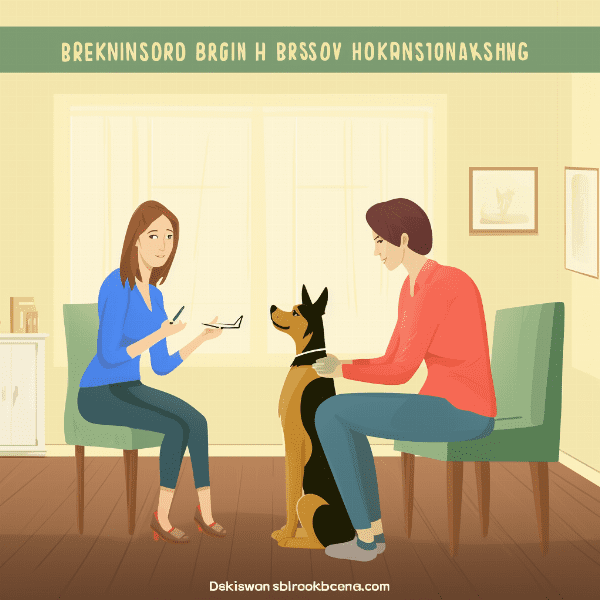Table of Contents
- Understanding the Reasons behind Dog Barking at Night
- Establishing a Bedtime Routine to Minimize Barking
- Creating a Comfortable Sleeping Environment for Your Dog
- Training Your Dog to Reduce Nighttime Barking
- Using Positive Reinforcement Techniques to Encourage Silence
- Providing Adequate Exercise and Mental Stimulation During the Day
- Seeking Professional Help for Persistent Barking Issues
- Exploring Natural Remedies to Calm Your Dog at Night
- Addressing Underlying Health Concerns That May Contribute to Barking
- Maintaining Consistency and Patience in Dealing with Nighttime Barking.
Understanding the Reasons behind Dog Barking at Night
Dogs are natural barkers, and barking is a way for them to communicate. However, excessive barking at night can be disruptive to both the dog’s owner and neighbors. As a responsible pet owner, it is essential to understand the underlying reasons for your dog’s nighttime barking. Here are some of the most common reasons why dogs bark at night:
Separation Anxiety
Dogs are social animals, and they crave attention and companionship. When left alone, especially at night, they may experience separation anxiety, leading to excessive barking. This type of barking is usually high-pitched and continuous, and your dog may also exhibit other signs of distress, such as pacing, drooling, or destructive behavior.
Territorial Behavior
Dogs are naturally territorial, and they will bark to alert their owners of any perceived threats to their territory. This type of barking may occur when your dog hears noises outside or senses the presence of other animals, such as cats or raccoons.
Environmental Triggers
Certain environmental factors, such as thunderstorms, fireworks, or sirens, can trigger barking in dogs. This type of barking is usually loud and persistent and may be accompanied by other signs of fear or anxiety, such as panting, trembling, or hiding.
Lack of Exercise or Mental Stimulation
Dogs that are not provided with adequate exercise or mental stimulation during the day may become restless and bored at night, leading to excessive barking. This type of barking may also be accompanied by other behavioral issues, such as chewing or digging.
Understanding the reasons behind your dog’s barking at night is the first step in addressing the issue. By identifying the root cause of your dog’s barking, you can take proactive steps to minimize or eliminate it altogether. The next sections will discuss practical strategies and techniques for dealing with your dog’s nighttime barking.

Establishing a Bedtime Routine to Minimize Barking
One of the most effective ways to minimize your dog’s barking at night is to establish a bedtime routine. A regular routine helps your dog understand when it’s time to sleep and reduces anxiety and restlessness that can lead to barking. Here are some tips for creating a bedtime routine that works for you and your dog:
Consistency is Key
Establish a consistent bedtime routine and stick to it every night. This will help your dog understand when it’s time to sleep and reduce anxiety and restlessness that can lead to barking. Your routine should include activities that help your dog wind down, such as a calming walk or cuddle time.
Calming Activities
Incorporate calming activities into your bedtime routine, such as gentle music, aromatherapy, or massage. These activities can help your dog relax and feel more comfortable, reducing the likelihood of barking.
Avoid Stimulating Activities
Avoid activities that may excite your dog before bedtime, such as playing fetch or roughhousing. These activities can increase your dog’s energy levels and make it more difficult for them to settle down.
Limit Food and Water Intake
Limit your dog’s food and water intake before bedtime to reduce the likelihood of barking due to bathroom breaks. Avoid feeding your dog for at least two hours before bedtime and make sure they have access to water earlier in the day.
Provide a Comfortable Sleeping Environment
Make sure your dog’s sleeping environment is comfortable and conducive to sleep. Provide a cozy bed, ensure the room is dark and quiet, and maintain a comfortable temperature.
Establishing a bedtime routine can take time and patience, but it’s worth the effort to reduce your dog’s nighttime barking. By providing a consistent and calming routine, you can help your dog feel more relaxed and comfortable, leading to a peaceful night’s sleep for both you and your furry friend.

Creating a Comfortable Sleeping Environment for Your Dog
A comfortable sleeping environment is essential for your dog’s overall health and wellbeing. Providing a cozy and comfortable space can help reduce anxiety and restlessness that can lead to nighttime barking. Here are some tips for creating a comfortable sleeping environment for your dog:
Choose the Right Bed
Choosing the right bed for your dog is crucial in creating a comfortable sleeping environment. Consider your dog’s size, age, and sleeping preferences when selecting a bed. Orthopedic beds can be a good option for older dogs or those with joint issues, while bolster beds provide extra support and security.
Provide Adequate Bedding
Provide adequate bedding to ensure your dog is warm and comfortable. Consider adding a soft blanket or pillow to the bed for extra coziness.
Block Out Noise and Light
Ensure your dog’s sleeping area is free from noise and distractions that can disrupt sleep. Consider using a white noise machine or earplugs to block out noise, and use blackout curtains or shades to block out light.
Keep the Sleeping Area Clean
A clean sleeping area is crucial for your dog’s health and comfort. Ensure the bedding and surrounding area are cleaned regularly to prevent odors and bacteria buildup.
Creating a comfortable sleeping environment for your dog is essential in reducing nighttime barking. By providing a cozy and relaxing space, you can help your dog feel more secure and comfortable, leading to a better night’s sleep for both you and your furry friend.

Training Your Dog to Reduce Nighttime Barking
Training is an effective way to reduce your dog’s nighttime barking. By teaching your dog alternative behaviors and reinforcing positive behavior, you can help them learn to be calm and quiet at night. Here are some tips for training your dog to reduce nighttime barking:
Identify the Triggers
Identify the triggers that cause your dog to bark at night. This can be anything from noise outside to anxiety due to separation. Once you have identified the triggers, you can start to work on training your dog to respond differently.
Teach the “Quiet” Command
Teach your dog the “quiet” command by rewarding them for being quiet and redirecting their attention when they bark. Start by saying “quiet” when your dog barks and then rewarding them when they stop. Over time, your dog will learn to associate the “quiet” command with being calm and quiet.
Use Desensitization Techniques
Desensitization techniques can be used to help your dog overcome their anxiety triggers. This involves exposing your dog to the trigger in a controlled manner and rewarding them for being calm and quiet. Over time, your dog will learn to associate the trigger with positive behavior, leading to less barking.
Seek Professional Help
Training your dog to reduce nighttime barking takes time and patience, but it is worth the effort. By teaching your dog alternative behaviors and reinforcing positive behavior, you can help them learn to be calm and quiet at night, leading to a peaceful night’s sleep for both you and your furry friend.

Using Positive Reinforcement Techniques to Encourage Silence
Positive reinforcement is a powerful tool for encouraging your dog to be quiet at night. By rewarding your dog for being quiet and calm, you can reinforce positive behavior and reduce nighttime barking. Here are some tips for using positive reinforcement techniques to encourage silence:
Reward Calm Behavior
Reward your dog when they are calm and quiet at night. This can be a treat, verbal praise, or a favorite toy. Over time, your dog will learn that being calm and quiet is rewarded and will be more likely to continue the behavior.
Use a Clicker
A clicker can be an effective tool for positive reinforcement training. Click the clicker when your dog is quiet and calm, and then reward them with a treat. Over time, your dog will learn to associate the sound of the clicker with positive behavior.
Avoid Punishment
Avoid punishing your dog for barking at night. Punishment can increase anxiety and fear, leading to more barking. Instead, focus on positive reinforcement and reward your dog for being quiet and calm.
Be Patient
Positive reinforcement training takes time and patience. It may take several weeks or even months for your dog to learn to be quiet at night. Be patient and consistent, and your efforts will pay off in the end.
Using positive reinforcement techniques to encourage silence is an effective way to reduce your dog’s nighttime barking. By rewarding calm and quiet behavior and avoiding punishment, you can reinforce positive behavior and help your dog learn to be calm and quiet at night.

Providing Adequate Exercise and Mental Stimulation During the Day
Providing adequate exercise and mental stimulation during the day can help reduce your dog’s nighttime barking. Dogs that are tired and mentally stimulated are more likely to sleep soundly at night, leading to less barking. Here are some tips for providing adequate exercise and mental stimulation during the day:
Regular Exercise
Regular exercise is essential for your dog’s physical and mental health. Aim to provide your dog with at least 30 minutes of exercise per day, such as a walk, run, or playtime in the yard. This can help tire your dog out and reduce restlessness at night.
Mental Stimulation
Mental stimulation is just as important as physical exercise for your dog’s overall wellbeing. Provide your dog with mentally stimulating activities, such as puzzle toys, hide-and-seek games, or obedience training. These activities can help tire your dog out and reduce anxiety and restlessness at night.
Consider Doggy Daycare or a Dog Walker
If you are unable to provide your dog with adequate exercise and mental stimulation during the day, consider doggy daycare or hiring a dog walker. These services can provide your dog with the exercise and stimulation they need, leading to less barking at night.
Provide Access to Outdoor Space
If possible, provide your dog with access to outdoor space during the day. This can be a yard or a designated play area. Outdoor time can provide your dog with the exercise and mental stimulation they need, leading to less barking at night.
Be Consistent
Consistency is key when providing exercise and mental stimulation for your dog. Aim to provide daily exercise and mental stimulation, and be consistent with your routine. This will help your dog feel more comfortable and secure, leading to better sleep at night.
Providing adequate exercise and mental stimulation during the day is crucial in reducing your dog’s nighttime barking. By providing regular exercise, mental stimulation, and access to outdoor space, you can help tire your dog out and reduce anxiety and restlessness at night.

Seeking Professional Help for Persistent Barking Issues
Underlying Medical Issues
Persistent barking may be a sign of an underlying medical issue, such as pain or anxiety. A veterinarian can help rule out any medical conditions that may be contributing to your dog’s barking.
Behavioral Issues
Persistent barking may also be a sign of underlying behavioral issues, such as separation anxiety or aggression. A professional dog trainer or behaviorist can provide customized training and advice to address these issues.
Personalized Training
A professional trainer or behaviorist can provide personalized training and advice that is tailored to your dog’s specific needs. They can assess your dog’s behavior and provide customized training to address any issues.
Last Resort
Seeking professional help should be considered a last resort, after all other methods have been exhausted. Professional help can be expensive, and it is important to exhaust all other options before seeking professional assistance.
If your dog’s barking persists despite your efforts to reduce it, seeking professional help may be necessary. A professional trainer or behaviorist can provide personalized training and advice to address any underlying medical or behavioral issues. Remember, seeking professional help should be considered a last resort, after all other options have been exhausted.

Exploring Natural Remedies to Calm Your Dog at Night
Natural remedies can be an effective way to calm your dog at night and reduce nighttime barking. Here are some natural remedies to explore:
Calming Herbs
Certain herbs, such as chamomile and valerian root, can have a calming effect on dogs. These herbs can be given in the form of teas or supplements, but it is important to consult with a veterinarian before giving your dog any new supplements or remedies.
CBD Oil
CBD oil is a natural remedy that has become popular in recent years for its calming effects on both humans and pets. CBD oil can be given in the form of treats or drops, but it is important to consult with a veterinarian before giving your dog any new supplements or remedies.
Aromatherapy
Certain scents, such as lavender and chamomile, can have a calming effect on dogs. Consider using a dog-friendly essential oil diffuser or spritzing a calming spray in the sleeping area.
Massage
Gentle massage can be a calming and relaxing activity for dogs. Consider incorporating massage into your bedtime routine to help your dog relax and feel more comfortable.
Thundershirt
A thundershirt is a snug-fitting garment that can help calm dogs with anxiety or restlessness. The pressure from the thundershirt can have a calming effect on dogs and reduce nighttime barking.
Exploring natural remedies can be an effective way to calm your dog at night and reduce nighttime barking. However, it is important to consult with a veterinarian before giving your dog any new supplements or remedies. Remember, natural remedies should be considered as a supplement to training and behavioral modification, and should not be relied on as the sole solution to nighttime barking.

Addressing Underlying Health Concerns That May Contribute to Barking
Barking can be a sign of underlying health concerns, such as pain, anxiety, or illness. Addressing these health concerns can help reduce nighttime barking. Here are some steps to take if you suspect that your dog’s barking may be related to underlying health concerns:
Schedule a Veterinary Checkup
Schedule a veterinary checkup to rule out any underlying medical conditions that may be contributing to your dog’s barking. Your veterinarian can perform a physical exam and recommend any necessary tests or treatments.
Address Dental Issues
Dental issues, such as gum disease or tooth decay, can cause pain and discomfort, leading to nighttime barking. Ensure that your dog’s teeth are clean and healthy, and address any dental issues promptly.
Address Anxiety and Stress
Anxiety and stress can cause restlessness and nighttime barking. Consider natural remedies or prescription medications to help calm your dog and reduce anxiety and stress.
Address Hearing and Vision Loss
Hearing and vision loss can cause confusion and anxiety, leading to nighttime barking. If you suspect that your dog may be experiencing hearing or vision loss, consult with a veterinarian and take steps to make your home environment more accessible and comfortable for your dog.
Addressing underlying health concerns is essential in reducing your dog’s nighttime barking. By addressing any medical or dental issues, reducing anxiety and stress, and making your home environment more accessible and comfortable, you can help your dog feel more secure and calm at night, leading to less barking.

Maintaining Consistency and Patience in Dealing with Nighttime Barking.
Dealing with nighttime barking can be frustrating and challenging, but maintaining consistency and patience is essential in achieving long-term success. Here are some tips for maintaining consistency and patience in dealing with nighttime barking:
Develop a Bedtime Routine
Develop a bedtime routine that is consistent and predictable. This can include activities such as a walk, a meal, and a calming activity like reading or watching TV. Stick to the same routine every night to help your dog feel more comfortable and secure.
Stay Calm and Patient
Staying calm and patient is essential when dealing with nighttime barking. Avoid yelling or punishing your dog, as this can increase anxiety and fear, leading to more barking. Instead, use positive reinforcement techniques and be patient with your dog’s progress.
Be Consistent with Training
Consistency is key when training your dog to reduce nighttime barking. Stick to a regular training routine and avoid deviating from it. Consistent training will help your dog understand what behavior is expected of them and lead to long-term success.
Avoid Reinforcing Negative Behavior
Avoid reinforcing negative behavior by ignoring barking or other undesirable behavior. Reinforcing negative behavior can make it worse, while ignoring it can help extinguish the behavior over time.
Monitor Progress
Monitor your dog’s progress and adjust your training routine as needed. Celebrate small successes and be patient with setbacks. Over time, your dog will learn to be calm and quiet at night with consistent training and patience.
Maintaining consistency and patience is key when dealing with nighttime barking. Develop a bedtime routine, stay calm and patient, be consistent with training, avoid reinforcing negative behavior, and monitor progress. With time and effort, you can help your dog learn to be calm and quiet at night, leading to a peaceful night’s sleep for both you and your furry friend.




